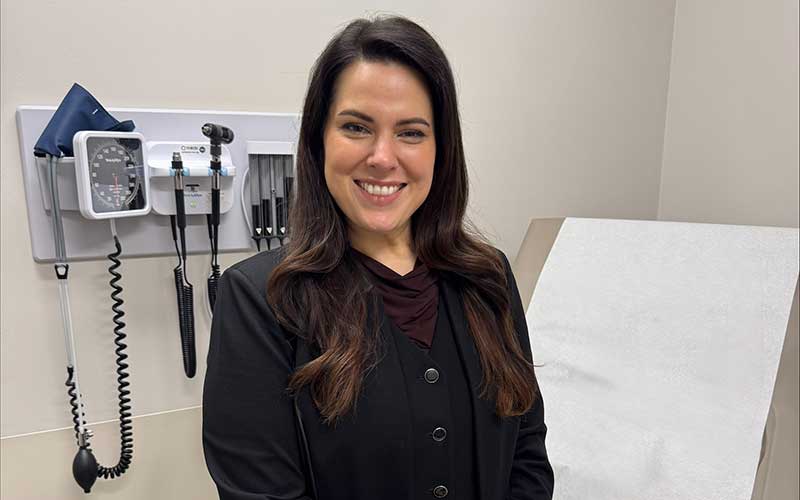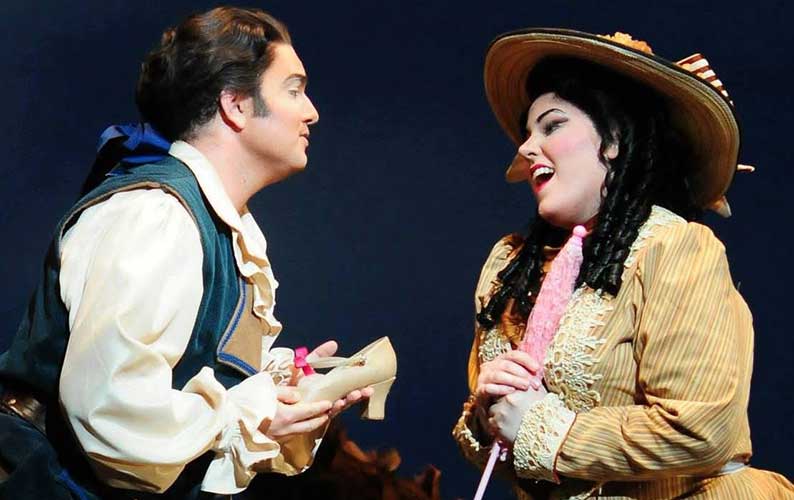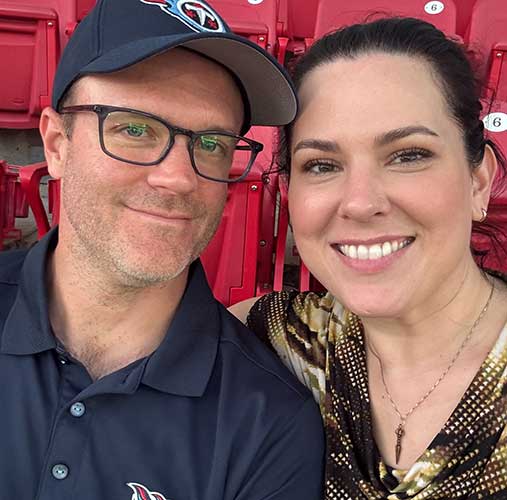Brooke Hazen started in the VUMC Neurology Department in January 2024 and hasn’t looked back. She originally trained as an opera singer, but when her path led to medicine, she pursued it with the same zeal she brought to music. Brooke’s regular meditation practice helps her stay focused on the compassion essential for patient care. While she no longer performs in public often, you can catch her singing “carpool karaoke” on social media.

Tell us about your background and how your path led to Vanderbilt.
I was born in Nashville, but I grew up in a little town called Pelham, Tennessee. I grew up mainly studying music as a child. I was a pianist from the age of three, and I was always going to music lessons. But my dad was an EMT, and I was always wanting to look at his EMT guide book because I was just fascinated by the medical concepts. He always tried to put it away because he was afraid I’d see something that would scare me, but it never did. I did well in school, but I really excelled in music. Eventually I discovered that voice was really my thing; I started taking voice lessons and became comfortable performing. As a child, I did not anticipate I would ever study opera, but I was fascinated by it. I was always reading books about it and listening to it without realizing it was opera.
In high school, I was in a variety of choral activities and got connected with an opera singer who had retired from an international career and who was now teaching. He met with me, heard me sing, and agreed to work with me. I studied with him for my undergraduate degree at MTSU in vocal performance.

My best friend was also getting a music degree but was planning to go on to medical school. He encouraged me to look into it, but I was not interested at that time since I wanted to be a professional opera singer. After undergrad, I was hopeful I would go on to study at the Eastman School of Music, but I didn’t get in.
At that point I reevaluated everything about my priorities, and that is when I recalled my interest in medicine from years prior. I immediately went right back to school to get some of the courses my friend was taking in preparation for medical school. I really looked at all kinds of medical careers and what the jobs looked like, the schooling, the kind of people in those careers. I knew I wanted a job that was going to be keeping me aware of new things, learning constantly, and that had mobility where I could change up my specialty. I also wanted stability in my career. That is something often lacking in an opera singer’s career path. At one point, I was with my dad at a doctor’s appointment and someone suggested the Vanderbilt School of Nursing Bridge program (now called the “Master of Nursing” degree). The Bridge program was geared toward adult learners. It was accelerated and very difficult, but I did it and it was the best thing I ever did.
Aside from observing your dad’s work as an EMT, were there other factors that piqued your interest in a medical career?
Another side story that goes throughout my life story is that my father was in Vietnam and was exposed to Agent Orange. He was very sick and got diagnosed with many different illnesses–polyangiitis overlap syndrome, cancer, kidney failure on dialysis, stroke, Paget’s Disease of the Bone, heart attacks, etc. I was his caretaker along with my mother, going to all the doctors appointments and therapies since I was nine years old. I saw medicine and what it was like to be on the patient side of chronic illness. I learned how to be a patient advocate and how to navigate the medical sphere. It was something that very much informed me and continues to inform my practice in how I treat patients.
How did you get into the neurology department?
At the time I was looking for a job, and I heard from the general neurology and stroke divisions which I had never actually applied to. This was great because I was actually looking for something broader to keep my interest on the day to day. I enjoyed talking with Dr. David Curfman and Dr. Kelly Brown. They were very interested in me because I had a doctorate and they were looking for someone to help with the APP fellowships. Once I started working in neurology, I remember telling one of the doctors that I didn’t want to practice in any other field because I had found my calling.
What are some of your favorite aspects about your job?
I especially love headache medicine. I love doing new headache evaluations, getting patients set up to help them with these debilitating headaches. I love the puzzle pieces of diagnosis, which is something I get to do in general neurology. I also love sharing resources with my patients and colleagues. I go to lots of conferences and whenever I get back I share what I learned with everyone.
Who have been some important mentors for you?
One of our APP leads, John Kramer, PA, was very integral in my foundation of learning when I first started. When I started working at the Nolensville clinic, I worked closely with Dr. Zach Rohm. He and Dr. David Curfman, were integral to how I practice now. But I’ve had several mentors here who I really appreciate and who continue to teach me.

What is your advice to someone who wants to come from a different field?
If they were thinking of becoming a nurse practitioner, physician’s assistant, or doctor, they need to be very comfortable with being the person who is diagnosing and treating someone. That involves taking responsibility for hearing someone out, diagnosing, offering a medication or therapy, and understanding there could be potential drawbacks or side effects. You are working with people who are sick and who need help, and they need you to know what you’re doing. Even if we don’t always know the answer, we can work with our colleagues as a collaborative team, but we need to feel comfortable with the responsibility.
Also, you can try to treat it like a job and work 8-5, but those people don’t tend to be as happy. The people who are enjoying this are the people who treat it like a career and this is their interest—they want to read about it on the weekend. (Don’t get me wrong, we need our time off too!)
I would also advise considering how much of a “people person” you are. Are you willing to sit all day long and listen to people? At the Vanderbilt School of Nursing, they often reminded us that these patients are vulnerable and they’re coming to you asking for help, and you’re being given the privilege of helping them. It's easy to lose that thought, but when you do, you can get burned out.
How do you like to spend your free time? What does a typical weekend look like?
I’m still a musician. I don’t perform often like I did, but I do a carpool karaoke type of thing after long days at work particularly. After work I like to pull up outside my house and karaoke a song then put it on my social media. “What do you do after a day in the neurology clinic? Sing, of course!”

I focus on recharging during the weekends. That’s when I get the most time with my fiancé, Seth. I love shopping. Seth and I are always up for playing with our two English Cream Golden Retrievers, Lily and Teddy. Also, I’m a Tibetan Buddhist meditation practitioner, and on the weekends they have a couple of sessions at the temple I attend. I meditate during the week, but on the weekends I go see my friends at the temple, so it’s fun to recharge. In my career, meditating helps remind me of the tenderness and compassion needed to help people who are suffering.
What are you currently reading?
I usually am reading something on Tibetan Buddhism since that is my academic interest also. Currently I’m reading Words of My Perfect Teacher and Anna Karenina. I usually have two or three books going on at the same time. I love audiobooks!